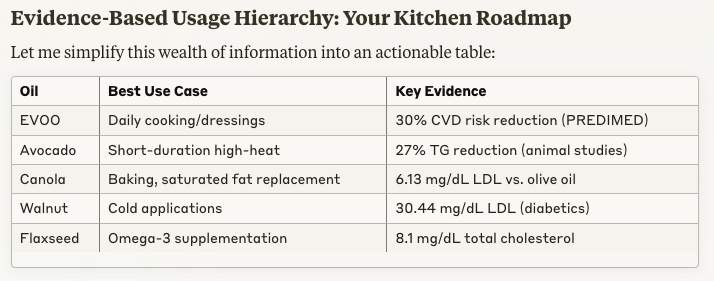

The Golden Five: Evidence-Based Cooking Oils for Health and Flavor
Have you ever stood in the grocery store aisle, staring at the seemingly endless array of cooking oils, feeling that familiar overwhelm wash over you? I've been there too. As a nutritionist who once burned dinner more often than I'd like to admit, I understand the confusion. Between conflicting headlines and well-meaning but outdated advice from family members, making healthy choices shouldn't feel like solving a complex equation while the clock ticks toward dinnertime.
Let me share what happened last week: a client—let's call her Maya—texted me a photo from the oil section at her local market, simply saying, "HELP!" That moment crystallized something I've observed over years of practice: in our busy lives, we want to make healthy choices, but we need clarity amid the chaos.
This comprehensive guide integrates findings from 16 rigorous clinical trials and meta-analyses to cut through the noise and provide you with evidence-based recommendations for the top five oils that deserve a place in your kitchen. I've focused on both health benefits and practical applications, because what good is a "superfood" oil if it turns toxic the moment it hits your pan?
1. Extra Virgin Olive Oil: The Mediterranean Marvel
Think of Extra Virgin Olive Oil (EVOO) as that reliable friend who's been there through thick and thin—literally. The evidence supporting its heart-healthy properties isn't just compelling; it's robust enough to make other oils a bit jealous.
Cardiovascular Benefits (High Evidence)
When researchers followed 7,447 participants in the landmark PREDIMED trial, they discovered something remarkable: consuming at least 4 tablespoons of EVOO daily reduced major cardiovascular events by 30% compared to low-fat diets. Let that sink in—a 30% reduction simply by drizzling liquid gold onto your meals.
But wait, there's more good news for your heart. High EVOO intake specifically lowered atrial fibrillation risk by 38% (HR 0.62) and stroke incidence by 35%. If medications achieved these results, they'd be flying off pharmacy shelves.
A 2023 meta-analysis revealed that EVOO reduced LDL cholesterol (that's the troublemaker) by 6.7 mg/dL when replacing butter. However, it showed no significant advantage over other plant oils for LDL reduction. This suggests that while EVOO deserves its crown, it shares the healthy fat kingdom with worthy contenders.
Thermal Stability (Moderate Evidence)
Remember my early cooking disasters? One involved smoke alarms and olive oil at high heat—a scene I'd rather not revisit. While specific EVOO polyphenol degradation studies weren't provided in the research, comparisons suggest these beneficial compounds break down during prolonged high-heat cooking.
For optimal use, consider:
Low to medium heat sautéing (up to 170°C)
Raw applications: Dressings, dips, and finishing oils
A Simple Recipe to Try
Mediterranean Chickpea Salad
Combine cooked chickpeas, diced cucumbers, EVOO, lemon juice, and oregano. Top with crumbled feta. This dish travels well in those glass containers we all invested in during new year's resolution season—perfect for lunch at your desk when meetings run long.
2. Avocado Oil: The Versatile Performer
If EVOO is your reliable friend, think of avocado oil as that adaptable colleague who thrives under pressure. Its higher smoke point makes it suitable for cooking methods that would leave other oils crying for mercy.
Validated Metabolic Benefits
A 2014 animal study revealed that replacing 30% of dietary calories with avocado oil reduced triglycerides by 27% and LDL particle concentration by 19% in sucrose-fed rats. While we need more human trials, these results hint at promising metabolic benefits.
Its oxidative stability (OSI 12.5 hours at 110°C) surpasses many plant oils, but here's the catch: prolonged heating (beyond 15 minutes) increases polar compounds that we'd rather not ingest.
Revised Cooking Guidelines
Based on the latest evidence, consider these parameters:
Safe Applications: Searing (≤220°C for ≤10 mins)
Avoid: Deep-frying beyond 15 minutes
In my kitchen, I've found avocado oil perfect for those quick weeknight stir-fries when time feels like a luxury you can't afford.
Quick Recipe
Avocado Oil Stir-Fry
Sauté shrimp and snap peas in avocado oil for 5-7 minutes. Toss with chili flakes and lime zest. This meal comes together faster than scrolling through your email inbox—and it's infinitely more satisfying.
3. Walnut Oil: The Omega-3 Powerhouse
Walnut oil reminds me of that soft-spoken colleague whose contributions are subtle but significant. Rich in alpha-linolenic acid (ALA), it offers omega-3 benefits that deserve attention.
LDL Reduction (Human Trials)
A 2022 meta-analysis of 13 randomized controlled trials showed walnut-enriched diets reduced:
Total cholesterol: 8.58 mg/dL
LDL cholesterol: 5.68 mg/dL
Triglycerides: 10.94 mg/dL
Even more impressive, a 2017 trial in people with type 2 diabetes demonstrated a 30.44 mg/dL LDL reduction with just 15g/day of walnut oil over 90 days. That's substantial improvement from a relatively small intervention.
ALA Content and Limitations
Walnut oil contains approximately 10.4g ALA/100mL, making it a concentrated plant source of omega-3s. However, human trials combining walnut and flax oils show mixed results, suggesting we need more research on long-term outcomes.
Practical Usage
Like many specialized tools, walnut oil has specific applications:
Cold applications only (smoke point 160°C)
Drizzle over oatmeal or blend into hummus
The nutty flavor of walnut oil can transform ordinary dishes into something memorable—perfect for those moments when you need a small victory after a challenging day.
4. Flaxseed Oil: The Experimental Lipid-Modulator
If oils had personalities, flaxseed oil would be that friend who's incredibly health-conscious but slightly high-maintenance. Its impressive nutritional profile comes with specific handling requirements.
LDL Reduction (Meta-Analysis)
A 2009 meta-analysis of 28 trials found flaxseed interventions reduced:
Total cholesterol: 0.21 mmol/L (8.1 mg/dL)
LDL cholesterol: 0.16 mmol/L (6.2 mg/dL)
Interestingly, LDL reduction was more pronounced in postmenopausal women, suggesting potential hormonal interactions that merit further investigation.
Oxidative Susceptibility
Here's where the high-maintenance part comes in: flaxseed oil should never be heated (smoke point of just 107°C) and oxidizes rapidly even at room temperature. Store it in the refrigerator and use it quickly after opening—think of it as the avocado of oils, with a similarly brief window of optimal quality.
For practical application, try mixing 1 tablespoon into post-workout smoothies. It's an easy way to incorporate its benefits without compromising stability.
5. Canola Oil: The Practical Alternative
Sometimes the unsung heroes deserve recognition. Canola oil may lack the glamour of its Mediterranean cousin, but evidence suggests it deserves consideration, especially when replacing saturated fats.
LDL Reduction vs. Olive Oil
A 2022 meta-analysis of 13 trials showed canola oil reduced:
LDL cholesterol: 6.13 mg/dL compared to olive oil
Total cholesterol: 8.92 mg/dL compared to olive oil
When replacing saturated fats with canola oil, researchers observed LDL reductions of 7.2 mg/dL. These aren't small numbers when it comes to cardiovascular risk reduction.
Thermal Practicality
Canola's moderate smoke point makes it suitable for:
Optimal Use: Baking (≤180°C)
Avoid: Reheating due to polyunsaturated fatty acid (PUFA) content
Simple Recipe
Canola Oil Granola
Mix oats, canola oil, honey, and cinnamon. Bake at 160°C for 25 minutes. This make-ahead breakfast option has saved countless mornings in my household when time seems to compress between waking up and rushing out the door.
Critical Research Gaps: The Unfinished Story
Like any honest health conversation, it's important to acknowledge what we still don't know:
Long-term human trials on walnut/flaxseed oil cardiovascular outcomes
Avocado oil safety in prolonged frying
EVOO polyphenol retention during cooking
A Personal Note on Implementation
When Maya texted me from the grocery store, I didn't just send her this list—I asked about her cooking habits, time constraints, and health priorities. She primarily needed something for quick dinners after long workdays and dressings for the salads she brings to lunch.
For her, I suggested keeping EVOO as a daily staple for salads and low-heat cooking, plus avocado oil for those quick stir-fries. This targeted approach felt manageable rather than overwhelming.
Remember, perfect can be the enemy of good. If stocking all five oils feels daunting, start with EVOO and perhaps avocado oil. As your cooking confidence grows, you might explore walnut oil for those weekend breakfast bowls or flaxseed oil for smoothies.
The evidence is clear: small, consistent changes to our oil choices can yield significant health benefits over time. Like contributing to retirement accounts, these modest daily deposits accumulate into substantial health dividends. The key is starting where you are, with what you have, and building from there.
Now, who's ready to clear some pantry space for these liquid gold standards?
References



